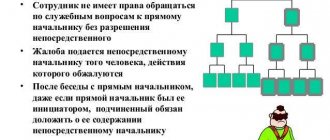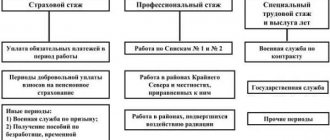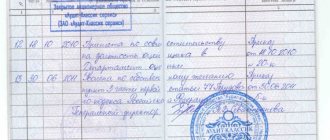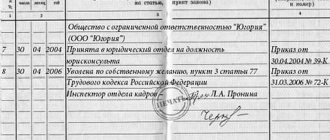Article 70 of the Labor Code of the Russian Federation. Employment test
When concluding an employment contract, by agreement of the parties, it may include a provision for testing the employee in order to verify his compliance with the assigned work.
The absence of a probationary clause in the employment contract means that the employee was hired without a trial. In the event that an employee is actually allowed to work without drawing up an employment contract (part two of Article 67 of this Code), the probationary clause can be included in the employment contract only if the parties formalized it in the form of a separate agreement before starting work.
During the probationary period, the employee is subject to the provisions of labor legislation and other regulatory legal acts containing labor law norms, collective agreements, agreements, and local regulations.
A hiring test is not established for:
persons elected through a competition to fill the relevant position, conducted in the manner established by labor legislation and other regulatory legal acts containing labor law norms;
pregnant women and women with children under the age of one and a half years;
persons under the age of eighteen;
persons who have received secondary vocational education or higher education in state-accredited educational programs and are entering work for the first time in the acquired specialty within one year from the date of receiving vocational education at the appropriate level;
persons elected to elective positions for paid work;
persons invited to work by way of transfer from another employer as agreed between employers;
persons concluding an employment contract for a period of up to two months;
other persons in cases provided for by this Code, other federal laws, and a collective agreement.
The probationary period cannot exceed three months, and for heads of organizations and their deputies, chief accountants and their deputies, heads of branches, representative offices or other separate structural divisions of organizations - six months, unless otherwise established by federal law.
When concluding an employment contract for a period of two to six months, the probationary period cannot exceed two weeks.
The period of temporary incapacity for work and other periods when the employee was actually absent from work are not included in the probationary period.
< Article 69 of the Labor Code of the Russian Federation > Article 71 of the Labor Code of the Russian Federation
Art. 71 of the Labor Code of the Russian Federation: dismissal during the probationary period and at its end
In addition to Art. 70 of the Labor Code of the Russian Federation, this area is also regulated by Art. 71 of this Code. It contains rules for the employer’s response to the results of the subject’s activities.
This is also important to know:
In what cases is the day of dismissal considered a working day?
Completion of the probationary period is usually not documented. If the test period has expired and the employee continues to work, then it is considered that he has passed the test and is recognized as an employee whose skills, discipline and work habits meet the requirements stated by the employer.
If the subject does not correspond to the position for which he is applying, then the employer is given the right to dismiss the candidate under a simplified procedure. According to the Labor Code of the Russian Federation, dismissal during a probationary period can occur during the period of testing.
In the case where the employer decides to dismiss an employee early because he has not completed the probationary period, Art. 71 of the Labor Code of the Russian Federation obliges the failed employee to notify of his decision three days before dismissal. At the same time, this notice must necessarily indicate the reasons for dismissal. Dismissal during the probationary period is carried out without payment of severance pay and without agreement with the trade union.
If an employee believes that he was fired unfairly, he can appeal the employer's decision in court.
If the employee himself wants to quit while undergoing probation (for example, if working conditions turn out to be such that do not meet his expectations), according to the Labor Code of the Russian Federation, he himself can interrupt the probationary period, but is obliged to notify the employer of his decision also before 3 days. Such notice must be in writing in the form of a statement and delivered to an authorized representative of the employer (sent by mail).
Consequences of establishing a probationary period
The main consequence of establishing a probationary period is the possibility of simplified termination of an employment contract , both for the employee and for the employer.
The simplified procedure is expressed in the fact that an “unsatisfactory test result” is sufficient to dismiss an employee during the probationary period. Although it is important to note that unsatisfactory results must be confirmed and must relate specifically to the employee’s business qualities . In other words, you cannot fire an employee if there are no business claims against him, but “they don’t get along.” In the latter case, the dismissal will be considered illegal. The procedure for an employee to act in case of illegal dismissal is described in a separate article.
The main evidence of an unsatisfactory test result can be:
- orders for disciplinary action,
- memos from the immediate superior about the unsatisfactory quality of work of the subordinate,
- explanatory notes from the employee himself on the facts of violations committed,
- an act drawn up based on the results of an internal audit, etc.
It is very important for the employer to have evidence that the employee was not doing his job. If an employee is late or absent, the entire procedure for bringing disciplinary action must be followed. If an employee swears obscenely at his colleagues, it is necessary to schedule an internal inspection, collect explanatory notes and draw up a report based on the results. And this should be done in every situation when the employee’s actions are not satisfactory. In court in a dispute over illegal dismissal, simple words about absenteeism and an irresponsible approach to work will not be enough.
Before dismissing an employee, the employer is obliged to notify him of the upcoming dismissal no later than three days in advance. The notice must indicate the reasons why the employer concluded that the test result was unsatisfactory. Only after three days from the date of notification, the employer can issue an order to terminate the employment contract, otherwise the dismissal may be considered illegal due to non-compliance with the established procedure. The dismissal order must be issued within the probationary period.
An employee can also terminate an employment contract in a simplified manner. If usually, when leaving at his own request, an employee is required to notify the employer two weeks in advance, then while on a probationary period, the employee must notify the employer of dismissal in just three days .
By and large, the establishment of a probationary period does not entail any other consequences other than a simplified procedure for terminating an employment contract. Therefore, during the probationary period, the employee is endowed with the same rights as other employees of the organization . In connection with the test, he cannot be given a lower salary, longer work hours, etc. The only difference with such an employee is that he can be dismissed in a simplified manner. In all other respects, he has the same rights and bears the same responsibilities as his colleagues.
Why and for whom is a probationary clause necessary in an employment contract?
The probationary period is important for both parties to the employment contract. It allows the employer:
- take a closer look at the new member of the work team;
- assess the skills, abilities, knowledge and competence of the employee;
- compare the employee’s level of training with the requirements that are placed on him when performing his job duties;
- make an informed decision about the employee’s suitability for the position offered to him.
This period is no less significant for the employee. During the probationary period he can:
- legally gain experience from more qualified company employees;
- analyze your abilities in relation to this position;
- study the general organizational and personalized nuances of working for a given employer;
- make a decision about the ability to work effectively and the acceptability of the atmosphere in the company (or conclude in time that it is necessary to part with this employer).
How long does the trial period last for a fixed-term employment contract?
If an employee is hired not on a permanent basis, but for a certain period, Art. 70 of the Labor Code of the Russian Federation limits the appetite of the company’s administration regarding the duration of the test period.
IMPORTANT! The trial cannot last more than 2 weeks if the employment contract is concluded for a period of 2 months to six months.
By introducing this restriction, legislators stopped possible abuses by companies in the form of establishing a probationary period equal to the period of duration of the employment relationship.
Whether a trial period can be established for civil servants, see the article “Probationary period for employment (nuances).”
Is experience taken into account?
According to Article No. 16 of the Code of the Russian Federation, an agreement must be concluded with an employee authorized to perform work at the enterprise. During the first five days, an order for appointment to a position is issued and an entry is made in the work book.
Free legal consultation We will answer your question in 5 minutes!
Call: 8 800 511-39-66
Free legal consultation
We will answer your question in 5 minutes!
Ask a Question
This also applies to new employees whose contract contains a clause on completing a probationary period. Articles 70 and 71 relate only to special conditions for accelerated dismissal, but do not in any way affect the infringement of human rights.
All days of testing are included in the total length of service. The employer does not have the right to draw up a contract retroactively.
Whatever the final results of the probationary period, whether the person remains in the organization or not, he has the right to official employment and the use of all rights provided for by the Labor Code of the Russian Federation.
When does Article 70 of the Labor Code of the Russian Federation allow an employer to establish testing procedures?
Article 70 of the Labor Code of the Russian Federation provides for the possibility of including a clause on a probationary period in an employment contract. It stipulates the following conditions:
- the probationary period is established by agreement of the parties;
- the presence of a probationary period and its duration are specified separately in the employment contract;
- Test procedures are aimed at checking the compliance of the employee’s skills and abilities with the job duties assigned to him.
In fact, employers usually only fulfill the second of these conditions.
The question of reaching an agreement between the parties to the employment contract in this situation is usually not even raised. The employee is given the opportunity to choose:
- or agree to the “test” condition set;
- or look for another job.
As for the purposes of testing procedures, different employers have their own:
- Some company managers really want to make sure the competence of the hired employee.
- However, other employers use legally permitted probationary procedures to their advantage - in order to save on wages by setting a minimum wage for the maximum permitted probationary period. In this case, the actual competence of the employee and his skills are not taken into account.
What does the absence of a “test” clause in the contract mean?
Art. 70 of the Labor Code of the Russian Federation does not allow any liberties with regard to test procedures. For example, an oral agreement between the parties to an employment contract to establish a probationary period has no legal force.
IMPORTANT! If the employment contract does not contain a clause on a probationary period, this means that the employee was hired without a trial.
Article 70 of the Labor Code of the Russian Federation protects the interests of an employee if he is forced to begin performing work duties without drawing up an employment contract with him.
IMPORTANT! If an employee is allowed to work, but an employment contract has not been drawn up with him, the clause on the probationary period must be included in the contract only in 1 case: if a probationary agreement was signed before the start of work.
Thus, the employer should not delay the execution of the employment contract. Then the test clause included therein will be enforceable.
For what periods can the probationary period be extended?
Art. 70 of the Labor Code of the Russian Federation not only guards the interests of the subjects, but also takes into account the reasonable requests of the employer.
Taking into account the importance of the employer assessing the competence of the employee being hired and whether he has the necessary skills, the legislator has provided a special bonus for companies.
IMPORTANT! If during the probationary period the subject fell ill or was absent from the workplace for any reason, the time of such absence is not counted towards the probationary period.
With this provision, the legislator stopped abuses by employees associated with their desire to shorten their probationary period.
You can find more complete information on the topic in ConsultantPlus. Free trial access to the system for 2 days.









